 The Ginger Ninja and I had a little time to kill before flying home from Connecticut last Sunday, so we headed over to Borders to get some cheap books.
The Ginger Ninja and I had a little time to kill before flying home from Connecticut last Sunday, so we headed over to Borders to get some cheap books.
Right now, thanks to a combination of:
- A Canadian Dollar that’s relatively strong in comparison to the U.S. Dollar (according to xe.com, it’s 94.22 cents U.S. as of this writing)
- Book jacket prices, which are determined months in advance and are based on the assumption that the Canadian Dollar would be weaker
…it’s far better for us Canadians to buy books in the states.
While at Borders, I saw a display full of Andrew Keen’s The Cult of the Amateur, whose subtitle is How Today’s Internet Is Killing Our Culture, which is covered in today’s New York Times. I had enough time to read the opening chapters and came to my conclusion, an old stand-by for stupid, reactionary works: I’ve seen better paper after wiping my ass.
I plan to write a more detailed review and compare it to David Weinberger’s Everything is Miscellaneous, which I received during my visit to the Berkman Center for Internet and Society at Harvard last week. However, I’m loath to fork over ducats to line Mr. Keen’s pockets, which would only encourage him to keep going. Perhaps one of you has a copy that s/he’d like to sell me?
In lieu of such a review, let me point you to Larry Lessig’s blog entry on it, and more importantly, this comment made in response to said blog entry:
Keen’s a tool. I don’t need to read his book.
What have institutions added to our culture in the last hundred and fifty years?
Nothing.
If they had been running Rodin’s shop they would have thrown out the “mistake” that revolutionized his work. When a plaster model fell over, breaking the arm off, Rodin liked it. And changed art forever.
What has Keen done?
Besides edit and criticize?
Amateurs create signal, institutions mediate it—but can never improve it, only standardize it.
Every time an artist steps into new territory, he or she is, by definition, an amateur. We could quadruple the number of institutions and credentialed practitioners and never gain a single thing culturally, economically, educationally or personally.
This is nothing more than some weird kind of complete self-hatred.
No Sun Ra, no Sex Pistols, No Rolling Stones, no Knut Hamsum, no Pushkin, no Ginsberg — no nobody.
The answer is to stop fixing content prices and allow the market to differentiate itself just like every other market does. We have all the jeans we could ever hope to care about. Why not allow premium content to do the same with movies, books, magazines, music and TV?
It will eventually happen once digital distribution finishes destroying the very institutions Keen is trying to impress.
It’s not a moral question but a economic one.